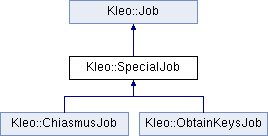#include <specialjob.h>

Signals | |
| void | result (const GpgME::Error &result, const TQVariant &data) |
 Signals inherited from Kleo::Job Signals inherited from Kleo::Job | |
| void | progress (const TQString &what, int current, int total) |
| void | done () |
Public Member Functions | |
| virtual GpgME::Error | start ()=0 |
| virtual GpgME::Error | exec ()=0 |
 Public Member Functions inherited from Kleo::Job Public Member Functions inherited from Kleo::Job | |
| virtual void | showErrorDialog (TQWidget *parent=0, const TQString &caption=TQString()) const |
| virtual TQString | auditLogAsHtml () const |
| virtual GpgME::Error | auditLogError () const |
| bool | isAuditLogSupported () const |
Protected Member Functions | |
| SpecialJob (TQObject *parent, const char *name) | |
 Protected Member Functions inherited from Kleo::Job Protected Member Functions inherited from Kleo::Job | |
| Job (TQObject *parent, const char *name) | |
Additional Inherited Members | |
 Public Slots inherited from Kleo::Job Public Slots inherited from Kleo::Job | |
| virtual void | slotCancel ()=0 |
Detailed Description
An abstract base class for protocol-specific jobs.
To use a SpecialJob, first obtain an instance from the CryptoBackend implementation, connect progress() and result() signals to suitable slots and then start the job with a call to start(). This call might fail, in which case the SpecialJob instance will have schedules its own destruction with a call to TQObject::deleteLater().
After result() is emitted, the SpecialJob will schedule its own destruction by calling TQObject::deleteLater().
Parameters are set using the TQt property system. More general, or constructor parameters are given in the call to Kleo::CryptoBackend::Protocol::specialJob().
The result is made available through the result signal, and through the read-only result property, the latter of which needs to be defined in each SpecialJob subclass.
Definition at line 65 of file specialjob.h.
Member Function Documentation
◆ exec()
|
pure virtual |
Implemented in Kleo::ChiasmusJob, and Kleo::ObtainKeysJob.
◆ start()
|
pure virtual |
Starts the special operation.
Implemented in Kleo::ChiasmusJob, and Kleo::ObtainKeysJob.
The documentation for this class was generated from the following file:

